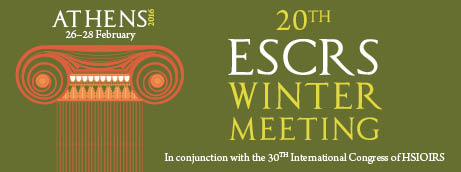Posters
(results will display both Free Papers & Poster)
Incidence and management of Myopic LASIK-related dry eye with topical cyclosporine A
Poster Details
First Author: F.Tzani GREECE
Co Author(s): A. Kanellopoulos G. Chatzilaou
Abstract Details
Purpose:
To evaluate safety and efficacy of topical cyclosporine-A administration in the management of transient dry eye associated with LASIK.
Setting:
Laservision.gr Clinical and Research Eye Institute, Athens, Greece
Methods:
Group-A (dry-eye) was formed from 105 (82 female, 23 male) eyes that developed clinically significant dry eye within one-month post-LASIK, and were subjected to cyclosporine-A treatment. A non-dry eye symptomatic age- and gender- matched group-B was formed from the same pool of patients to serve as control. Schirmer’s lacrimation and tear-break-up time (TBUT) tests were evaluated. Central corneal epithelial thickness (CET) and topographic epithelial thickness variability (TVT) were evaluated as quantitative dry-eye objective markers. Subjective patient survey was also assessed.
Results:
In group-A, at one month post-LASIK (commencement of cyclosporine-A treatment) mean Schirmer lacrimation test score 4.5±3.6mm (4-to-8). At 12-months post-LASIK, 8.2±2.1mm (7-to-13). The differences in Schirmer test results between 12-month vs the 1-month were statistically significant (p=0.02). The differences between the 6-month and 12-month versus the pre-operative were not statistically different (p=0.15 and p=0.27). At 1 month post-LASIK mean TBUT was 6.5±3.1-seconds (3-to-8). At 12-months, 7.6±2.0-seconds (8-to-19). The differences in TBUT between 12-month vs the 1-month were statistically significant (p=0.04), between the 6-month and 12-month versus the pre-operative were not statistically different (p=0.39 and p=0.45).
Conclusions:
Topical cyclosporine-A treatment is an effective alternative in the management of LASIK related transient dry eye. OCT epithelial mapping may provide an objective benchmark in diagnosing and monitoring this significant disorder and its correlation with visual symptoms. FINANCIAL DISCLOUSRE: One or more of the authors travel has been funded, fully or partially, by a company producing, developing or supplying the product or procedure presented


